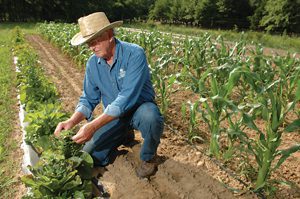By Renee Hunter
 Retired fisheries biologist Don Greenland has been fascinated by “all things biological” since his teens, so it is no surprise that his “hobbies” include gardening, beekeeping and sheep.
Retired fisheries biologist Don Greenland has been fascinated by “all things biological” since his teens, so it is no surprise that his “hobbies” include gardening, beekeeping and sheep.

By Renee Hunter
Retired fisheries biologist Don Greenland has been fascinated by “all things biological” since his teens, so it is no surprise that his “hobbies” include gardening, beekeeping and sheep. He has been a Master Gardener for 15 years, and transferred to the Faulkner County group from a Concord, N.C., branch in 1997. He enjoys the organization because it allows him to meet like-minded people, do public service projects and expand his gardening knowledge.
The organization has gardening projects throughout the county, including maintenance of the courthouse landscaping and the flower beds at all the libraries.
“One of my favorite projects is a youth garden at Oak Grove Commons,” Don said. He also enjoys working with the water-conservation garden adjacent to the Conway Corp. offices on Harkrider Street, and he looks forward to helping with the new historical garden at the Faulkner County Museum.
Each Master Gardener must give 40 hours of public service and earn 20 education hours annually. “Recently, I attended a class in Beebe on butterfly gardening,” Don said, adding that a butterfly garden might be a good Master Gardener project.
Master Gardening isn’t Don’s only interest, however.
It started with bees.
“I’ve always been interested in the critters,” he said. “I had hives when I was 16.”
His first encounter with bees was without protective gear. He was badly stung. “I had to get a shot,” he said. So he bought equipment and learned proper handling methods.
Don expects this year’s honey crop to be small because of all the cloudy weather. Bees navigate by the sun and don’t gather nectar on cloudy days – no nectar, no honey. A current concern, although it hasn’t reached Faulkner County, is Colony Collapse Disorder, a phenomenon in which the bees simply disappear from the hive. CCD’s cause is unknown, and if not discovered soon, CCD could become a problem, and not just for beekeepers and honey lovers, since bees pollinate many of the foods we eat. Research is being done, Don said, but more research funding is needed.
Don’s bees led him to another project: Growing seed crops. While attending a small-farm seminar in Columbia, Mo., three years ago, Don heard a talk by the Baker Seed Company founder on starting a seed business. He has been growing seeds for Baker ever since, and has grown things like Mexican squash, Zuk gourds, several varieties of peppers, an heirloom variety of okra, and bambara groundnut, a staple food in South Africa.
Often, Don has no idea what the crop being grown will look like or how much it will take to get the necessary amount of seed. “It’s fun to see what happens,” he said.
Growing plants for seed presents two problems: Preventing cross-pollination and harvesting difficulties. “For example, squash seeds are easy to do,” Don said. “But lettuce seed is about the same specific gravity as dust and hard to harvest.” Red Amaranth is hardest to harvest, Don says, because it must be rubbed through a screen to separate it and then winnowed using a fan.
Don has two gardens on “Downhill Farm,” so named because it slopes precipitously away from Schultz Road. In the “upper” garden, food is grown for the family table. Seed crops are grown “downhill.” The Greenland home is halfway between the two.
Don has also been growing shitake mushrooms for the past eight years. He began this project because he wanted a use for the hardwood being cleared off his 43 acres, and shitakes grow on hardwood logs. He learned how to do this from a grower in Shirley. He first drills holes in each log, then uses a hypodermic needle to inject the “spawn,” which looks like sawdust, into the holes and seals them with wax to keep insects out. At first, Don used 42-inch logs and hand-drilled the holes, a labor-intensive operation.
“I’ve refined my operation to what an old man can handle,” he said. He now uses shorter logs and uses a drill press to make the holes. A log will grow mushrooms for three years before it is depleted of nutrients.
“We probably get 20 pounds a year off 10-12 logs,” Don said.
In the past, Don has also raised exotic poultry, and currently he and his wife, Annette, have 14 Dorper-Katahdins, a variety of haired sheep developed in South Africa for meat.
“I threatened for years to get some sheep to mow the lawn,” Don explained. “And I finally did.”
The herd began in 2005 with two sheep. The newest additions are twins named Bonnie and Clyde.
“We don’t know where our sheep operation is going at this point,” Don said. They are approaching the maximum number for their space, but Annette cringes at the thought of selling for meat the animals she has grown fond of.
No doubt the current projects are not the last Don will tackle. After all, he is still fascinated by “biological things.”

